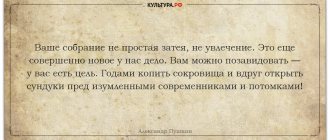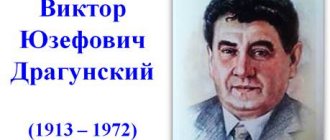K.D. Ushinsky. Stories and fairy tales for children. Works, biography, creativity
Bishka The lively cow Vaska Crow and crayfish Close together, but boring apart Wind and sun Raven and magpie In the forest in summer Wolf and dog Spring Boiled ax Wind Geese Carnation beds Viper Goose and crane Children in the grove Two plows Two goats Woodpecker Grandfather Complaints of a bunny Winter One story apple trees Playing dogs Chicken and ducklings Cuckoo How a shirt grew in the field As it comes around, so it responds Goat Kids and a wolf Cow Swallow Curiosity Goblin Summer Forest and stream Horse Fox and geeseLisa Patrikeevna Fox and goat Fox and wolf Men Mice Man and Bear Bear and log Not well tailored, but tightly sewn Don't spit in the well - you'll need to drink water Hunter of fairy tales Eagle and cat Eagle Eagle and crow Autumn Rooster and cat Trickster cat Cockerel with his family Rooster and dog Pranks of the old winter woman Bees and flies Bees on reconnaissance Birds Trip from the capital to the village Spider Stream Various fairy tales Scary goat Argument between water and fire Blind horse Postman's bag Animal dispute Tree dispute Cowardly Vanya Ducks Scientist bear Morning rays Know how to wait Four wishes Someone else's egg Brave dog Khleb Khavronya Read all stories
and fairy tales by Ushinsky Read stories by other authors
Brief biography and work of K.D. Ushinsky
Konstantin Ushinsky was born in Tula on February 19, 1823 in the family of a minor nobleman - a retired officer, a veteran of the War of 1812. The biography of Konstantin Dmitrievich Ushinsky indicates that he spent his childhood in the town of Novgorod-Seversky, located in the Chernigov province, on a small parental estate, where his father was sent to work as a judge. His mother died very early, at that time he was 12 years old. After graduating from the local gymnasium, Konstantin became a student at the Faculty of Law at Moscow University. He graduated with honors. Two years later he became acting professor of cameral sciences at the Yaroslavl Law Lyceum. However, his brilliant career was interrupted very quickly - in 1849. Ushinsky was fired for “unrest” among students; his progressive views contributed to this. In Russian and world pedagogy the name of K.D. Ushinsky
occupies a special and significant place.
In addition to his enormous contribution to the development of Russian pedagogical thought - he is rightly considered the creator of the Russian public school - his teaching about the spiritual side of human life, about the connection between social progress and the state of education is extremely important today. Ushinsky devoted most of his life to practical pedagogy. His main attention was focused on the creation of a Russian public school, as well as on issues of women's education (for several years he served as inspector of the Smolny Institute for Noble Maidens). In the field of public education, Ushinsky was guided by the traditional values of the life of the people. In the advent of the era of capitalism and industrialization, he saw “dirt” and “depravity.” And he argued that only the church and the school could lead “our simple people... into a larger and freer sphere.” Ushinsky theoretically comprehended his teaching practice in a large two-volume work “Man as a Subject of Education. Experience of pedagogical anthropology" (1868-1869). Many of the conclusions of this work are not outdated today. Also, certain provisions of his article “Native Word” (1861) are not outdated. Ushinsky
recognized moral education, the development of “moral feelings” as the cornerstone of personality formation.
One should educate, he believed, not by imposing one’s beliefs on the child, but by awakening in him “the thirst for these beliefs and the courage to defend them both from his own low aspirations and from others.” In the preface to the book “Children’s World and Reader” (1861), Ushinsky wrote that the appearance of this work was caused by “modern need.” He proclaimed the connection between science and life as the principle of introducing children to the basics of science. The purpose of his book is to give elementary school students as complete an understanding of the world as possible, which will help develop their thinking abilities. The material was arranged in sections: “From Nature”, “From Geography”, “From Russian History”, “First Lessons in Logic”. In the anthology appendix, the student became acquainted with “samples of the style of the best writers” - both with the classical works of Krylov, Zhukovsky, Pushkin, Lermontov, and with the works of modern authors - Nekrasov, Turgenev, Goncharov, Nikitin, Maykov, etc. The anthology also included works of foreign authors. The second educational book created by Konstantin Ushinsky was “Native Word” for young children. She, like the first one, was a great success. Just like “Children’s World...”, “Native Word” is a word composed on the basis of folklore, to which Konstantin Dmitrievich assigned an extremely important educational role, and on the best literary examples. Ushinsky strives here too to give children a system of real knowledge and to preserve encyclopedic breadth. Works for children
.
Ushinsky not only had teaching talent, but also proved himself to be a wonderful children's writer. His works, published in educational books, contain a clear moral lesson and provide readers with specific knowledge. For example, “Children’s World...” opens with the entertaining story “Children in the Grove,” which talks about the harmfulness of laziness and irresponsibility. The brother and sister went to school, but, attracted by the coolness of the grove, they rushed into it rather than into the school. However, neither the ant, nor the squirrel, nor the stream, nor the bird, to whom the children turn, wants to have fun with them - they all work. “What did you do, little sloths? - the tired robin tells them. “You didn’t go to school, you didn’t learn anything, you’re running around the grove and still stopping others from doing their work... Remember that only those who have worked and done everything they were supposed to do enjoy relaxing and playing.” The stories
"Winter", "Spring", "Summer" and "Autumn" give an idea of the changing seasons.
Simple concepts, clear language, calm intonation - everything predisposes the little reader to perceive the information contained in these stories. First, thawed patches appear in the fields; but soon the ground, wet, saturated with water, appears everywhere from under the snow. Another week or two will pass and the snow will only remain somewhere in a deep ravine where the sun does not shine. The sky is getting bluer and the air is getting warmer. Ushinsky
never misses the opportunity to turn from specific descriptions to higher matters, to conclusions aimed at spiritual development.
The story
“About Man” begins with the words: “I am a man, although still small, because I have the same soul and the same body as other people.”
Next comes a detailed description of the human body, and at the end there is a reminder: “Man is gifted with a beautifully constructed body, gifted with life, gifted with a soul - free, rational and immortal, desiring good and believing in the Creator of the Universe.” The anthology gives a short story about the organs of the human body, about how they quarreled among themselves, saw that it was bad, and made peace, “they began to work for each other as before - and the whole body recovered and became healthy and strong.” In the "Children's World..." section "From Russian History" Ushinsky's stories about important historical events are published. Ushinsky
his stories from history , relying on Karamzin and on the adaptation of his “History of the Russian State” made by Ishimova.
The special value of his stories about nature
and
animals
(“The Bunny’s Complaints,” “Bees on Scouting,” etc.) lies in the fact that nature is shown in them as an integral and beautiful world, full of secrets.
Spring has come, the sun has driven the snow away from the fields; Fresh, bright green stems were visible in last year’s yellowed grass; the buds on the trees were blooming and putting out young leaves. So the bee woke up from her winter sleep, cleared her eyes with her furry paws, woke up her friends, and they looked out the window: had the snow, ice, and cold north wind gone? Such stories by Ushinsky
as “Playing Dogs”, “Two Little Goats”, “The Horse and the Donkey” are essentially fables.
According to the fable tradition, the author ends them with moral maxims. It is not for nothing that they were included in a single section: Fables and prose stories. Ushinsky’s works
about children (for example, “Four Wishes”, “Together It’s Close, But Apart It’s Boring”, “Cowardly Vanya”) are distinguished by their subtle psychology and teach children life lessons using simple examples.
The author tactfully suggests what you need to get rid of in yourself, what character flaws may interfere in the future. So Vanya, left at home alone, was afraid of the dough in the kneading bowl: it puffs on the stove and makes him think of a brownie. Vanya rushed to run, but stepped on the poker - it hit him in the forehead; and then he fell, entangled in the frill of a bast shoe!.. The adults barely brought the cowardly boy to his senses. "Four Wishes" is a story about another character trait - indecision. The hero cannot reconcile his feelings with reason: all seasons seem equally beautiful to him, and he is not able to decide which of them is the most beloved, the most desired. Ushinsky
adapted folk tales for children.
He gave them preference even over a well-written literary work. He highly valued the poetic world of folk art and considered fairy tales the best means for “understanding folk life.” In the fairy tale “The Man and the Bear,” adapted by Ushinsky, the cunning man persuaded the bear that it was better for him to take the tops of the turnips, and the roots of the wheat; “Since then, the bear and the man have been apart from each other.” In another fairy tale, “The Fox and the Goat,” the Fox, having fallen into the well, assures the Goat that she is just resting here: “It’s hot up there, so I climbed up here. It's so cool and nice here! Cold water - as much as you want.” The Goat innocently jumps into the well, and the Fox “jumped onto the Goat’s back, from the back onto the horns, and out of the well.” Books by K.D. Ushinsky’s “Children’s World and Reader” and “Native Word” had a very great influence both on later teaching aids and on literature for children in general. Ushinsky’s pedagogical principles were used by Leo Tolstoy when compiling the famous “ABCs”. However, the life of this talented man was not long, the illness took all his strength, he was in a hurry to work and do as much as possible for others. In 1867, he returned to his homeland from Europe and a few years later, in 1871 (new style), he died, he was only 47 years old. —————————————————— Ushinsky’s stories and fairy tales for children. Read for free online Read all stories and fairy tales by Ushinsky Read stories by other authors
Stories and fairy tales (collection), page 1
Konstantin Dmitrievich Ushinsky
Stories and fairy tales
Collection
1824–1870
K. D. Ushinsky
There is no person in our country who does not know fairy tales about the pockmarked hen, about the bun, about brother Ivanushka and sister Alyonushka, who has not read the story “Four Wishes”, who has not repeated the sly joke about the lazy Titus: “Titus, go thresh.” - “My belly hurts.” - “Titus, go eat some jelly.” - “Where is my big spoon?”
All these and many other, equally well-known fairy tales, stories and jokes, some were composed, others retold by Konstantin Dmitrievich Ushinsky.
Konstantin Dmitrievich Ushinsky was born one hundred and eighty years ago, in 1824.
He spent his childhood in Ukraine, in the small town of Novgorod-Seversk and studied at the local gymnasium.
The gymnasium, Ushinsky recalled, was located in an old, dilapidated building that looked more like a barn than a school. “The windows in the old frames shook, the rotten floors, stained with ink and worn down by heel nails, creaked and jumped; the cracked doors were poorly made, the long old benches, which had completely lost their original color, were cut up and covered with writing by many generations of schoolchildren. There was something missing on these benches! And drawers of the most intricate workmanship, and ingenious, complex channels for draining ink, and angular human figures - soldiers, generals on horses, portraits of teachers; and countless sayings, countless fragments of lessons written down by a student who did not rely on his memory, squares for a game of cups, which consisted in the fact that a high school student, who managed to put three crosses in a row, mercilessly tore his partner by the forelock... In the lower classes it was so stuffy that some new teacher, not yet accustomed to our gymnasium atmosphere, winced and spat for a long time before starting his lesson.”
But the director of the gymnasium, I.F. Timkovsky, a writer and historian, a kind and educated person, managed to instill in the gymnasium students respect for knowledge, for science, and those gymnasium students who studied well enjoyed great respect among their comrades.
After high school, Ushinsky studied at Moscow University. And after graduating from university, he became a teacher himself.
At first he worked in Yaroslavl, then he was appointed to teach Russian literature - that’s what Russian language and literature classes were called in schools back then - at the Gatchina Orphan Institute, where orphans lived and studied.
When Ushinsky began teaching at the Gatchina Institute, he discovered that his students knew all subjects very poorly.
He saw the same thing at the Smolny Institute for Noble Maidens, where he was later transferred and where the daughters of nobles were raised. The girls were sure that buns grew on trees, and when one day they were asked to write an essay “Sunrise”, they could not even explain why the sun rises and sets.
But the worst thing was that they considered training to be martyrdom and punishment.
And so it is in all schools.
Ushinsky loved children very much and sympathized with them very much: it was really difficult for them to study. The textbooks they studied from were boring and incomprehensible, and the children, in order not to get a bad grade, had to memorize them.
And so Konstantin Dmitrievich Ushinsky decided to write a textbook that would be easy and interesting for children to learn from. And when studying is not painful, then the student studies and studies more successfully.
And Ushinsky compiled two such textbooks for elementary school. They were called “Native Word” and “Children’s World”.
“Native Word” and “Children’s World” were not at all like the previous boring textbooks. Everything about them was clear and very interesting. Once you start reading them, you won’t be able to put them down: you want to quickly find out what is written about on the next page.
Ushinsky included fairy tales in his books - some of them he heard in childhood and now retold, and some he invented himself.
He composed stories about what is close to children, what surrounds them in everyday life - about animals and birds, about natural phenomena, about the children themselves, about their activities and games.
He told the children that the bread they eat, the clothes they wear, the house they live in are all the work of people, and therefore the most necessary, most respected person in society is a worker: a peasant, an artisan, a worker .
Together with his friend, the young teacher Modzalevsky, Konstantin Dmitrievich composed poems and songs that were so easy to remember. They were also included in his books.
Among these songs was this one:
Children, get ready for school!
The cockerel crowed a long time ago!
Dress quickly!
The sun looks out the window.
Ushinsky's books revealed to children the big and small secrets of the huge world in which they were just beginning to live and in which there was so much that was unfamiliar, incomprehensible and mysterious.
And most importantly, they revealed the biggest secret: what is the joy and happiness of a person. From Ushinsky's stories and fairy tales, it was clear to everyone that only a kind, honest and hardworking person can be happy.
For the first time, Ushinsky’s books “Native Word” and “Children’s World” were published about two hundred years ago. Many generations learned from them: not only our grandparents, great-grandparents, but also great-great-grandmothers and great-great-grandfathers.
And today's schoolchildren read and love the fairy tales of Konstantin Dmitrievich Ushinsky.
It’s safe to say that these stories and fairy tales will be read and loved by many, many new generations, because people will always respect work, knowledge, honesty and kindness.
Vl. Muravyov
Children in the grove
Children in the grove
Two children, brother and sister, went to school. They had to pass by a beautiful, shady grove. It was hot and dusty on the road, but cool and cheerful in the grove.
– Do you know what? - said the brother to the sister. “We’ll still have time for school.” The school is now stuffy and boring, but the grove should be a lot of fun. Listen to the birds screaming there; And the squirrel, how many squirrels jump on the branches! Shouldn't we go there, sister?
The sister liked her brother's proposal. The children threw their alphabet books into the grass, held hands and disappeared between the green bushes, under the curly birch trees. It was definitely fun and noisy in the grove. The birds fluttered constantly, sang and shouted; squirrels jumped on the branches; insects scurried about in the grass.
First of all, the children saw a golden bug.
“Come play with us,” the children said to the bug.
“I would love to,” answered the beetle, “but I don’t have time: I have to get myself lunch.”
“Play with us,” the children said to the yellow, furry bee.
“I have no time to play with you,” answered the bee, “I need to collect honey.”
-Won't you play with us? - the children asked the ant.
But the ant had no time to listen to them: he dragged a straw three times his size and hurried to build his cunning dwelling.
The children turned to the squirrel, inviting it to also play with them, but the squirrel waved its fluffy tail and answered that it must stock up on nuts for the winter. The dove said: “I am building a nest for my little children.” The little gray bunny ran to the stream to wash his face. The white strawberry flower also had no time to take care of the children: he took advantage of the beautiful weather and was in a hurry to prepare his juicy, tasty berries on time.



